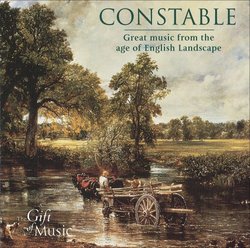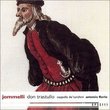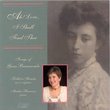| All Artists: Various Title: Constable Members Wishing: 0 Total Copies: 0 Label: The Gift of Music Original Release Date: 1/1/2003 Re-Release Date: 3/4/2004 Genre: Classical Styles: Chamber Music, Forms & Genres, Concertos, Instruments, Reeds & Winds, Symphonies Number of Discs: 1 SwapaCD Credits: 1 UPC: 658592105728 |
Search - Various :: Constable
 | Various Constable Genre: Classical
Constable Great music from the age of English landscape Nature is the source of all originality in art Like Gainsborough before him, John Constable was a native of Suffolk. Constable is considered to be one of the greatest... more » |
Larger Image |
CD Details
Synopsis
Product Description
Constable Great music from the age of English landscape Nature is the source of all originality in art Like Gainsborough before him, John Constable was a native of Suffolk. Constable is considered to be one of the greatest British landscape artists. His genius, though, unlike that of many precocious artists and musicians of his generation, was slow to mature. He was an eighteenth century figure who achieved success in middle age during the nineteenth century. It was not until the 1820s that he gained recognition and a full place as a Royal Academician. 'The Hay Wain' won a gold medal at the Paris Salon of 1824 and was widely recognised as a truly innovative and great painting. Constable spent many years studying the work of Gainsborough, for whom he retained a tremendous admiration, particularly his novel treatment of landscape, because landscape painting was the true love of Constable. He saw the landscape as an ever changing subject that was therefore challenging to put down on canvas: 'no two days are alike, nor even two hours; neither were there ever two leaves of a tree alike since the creation of the world'. This acute observation of the natural world led him to develop new ways of painting clouds and light in the open air. His view and technique was to see the countryside as it actually was, rather than as he might like it to be. The countryside in its natural state was always to be his inspiration. `The sound of water escaping from mill dams, willows, old rotten planks, slimy posts and brickwork, I love such things. These scenes made me a painter.' It was common during his life time for artists and musicians to travel in Europe and beyond, but Constable never left his native England, and his finest works are of scenes in Suffolk and Hampstead, where he lived from 1821. To render the shifting flicker of light and weather he abandoned fine traditional finish, catching the sunlight in blobs of pure white or yellow, and the drama of storms with a rapid brush. This musical programme presents one of the greatest musical equivalents of Constable's landscapes, the opening of Beethoven's 'Pastoral' Symphony. This was the closest Beethoven came to the later Romantic notion of programme music, and it may have been inspired by Beethoven's own visits to the countryside, where he seems to have found spiritual help towards his artistic vision of the world. Mozart is represented, too, by an extract from his clarinet concerto. This lovely piece could be considered as pastoral in style, not least because the clarinet was used by many composers for music of that type. The other works are by Pleyel and Sterkel. These last two composers are more likely to have been known to Constable than either Beethoven or Mozart, because their music was printed, published and heavily promoted across the whole of Europe by serious businessmen who were out to make money and establish their own 'brands' in an almost disturbingly modern way. Pleyel was one such figure. He was a gifted musician, and a genius of a businessman. Nearly every musical home in England would have had some of his music on the piano. These pieces were found in a collection belonging to Jane Austen, one of Constable's literary contemporaries, and this music was played in her home by her family and friends.
Similar CDs
| Worthless United Which Side Are You on? Genres: Alternative Rock, Pop, Rock Label: Chunksaah | |

 Track Listings (13) - Disc #1
Track Listings (13) - Disc #1


